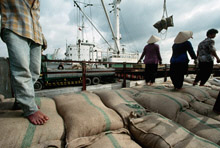
Typical street scene in Santa Ana, El Salvador. (Photo: iStock)
IMF Survey: Policy Response: How Countries Can Cope
July 1, 2008
- Challenge: protect poor from price shock while maintaining economic stability
- Universal food and fuel subsidies carry high fiscal costs
- Global food markets must be kept open
Countries can use a combination of monetary, trade, and fiscal responses to stave off and adjust to the damaging impact of high food and fuel prices, according to a new IMF study.

Export taxes, bans should be removed so that producers and consumers can adjust to higher food prices, IMF study says (photo: Steve Raymer/Corbis)
FOOD AND FUEL PRICE SPIRAL
The threat of hunger has dramatically raised the stakes for low and middle-income countries that rely on imported food and fuel. These countries must now figure out how to feed the hungry and maintain macroeconomic stability in the face of rising inflation and slowing growth.
Every country is different, and exact policy prescriptions will vary considerably. IMF teams are helping countries assess the macroeconomic impact of the food and fuel shocks and are providing advice on how to create fiscal space for more pro-poor spending, contain inflation through monetary and exchange rate policy, and structure trade policy so that it helps balance supply and demand.
The IMF is also providing technical assistance. For instance, it can help countries implement tax and tariff changes or design transfer programs targeted at the poor. It is prepared to quickly disburse funds to countries facing balance of payments gaps, and has already provided additional financing for seven low-income countries through its Poverty Reduction and Growth Facility.
Protect the poor
Countries are already using a wide array of policy tools to mitigate the impact of higher food and fuel prices. From an efficiency standpoint, it makes sense to pass on the full price increases to consumers because this will encourage producers to increase supply and consumers to reduce demand. At the same time, the poor must be protected, because they are least able to withstand the price increases.
The best approach is to develop a well-targeted social safety net. But many low-income countries have neither the capacity nor the fiscal means to do that. Understandably, most affected countries have therefore had to adopt other policies that could be implemented quickly.
Twenty-nine of the 46 countries reporting fuel subsidies have increased these subsidies in response to the surge in oil prices, now standing at over $140 a barrel. Such subsidies have risen to dramatic levels in some countries: five countries report spending more than 5 percent of GDP. Apart from being very costly, universal fuel subsidies encourage over-consumption, exacerbate the upward pressure on international fuel prices, and are difficult to reverse.
Higher consumption
Eighty-four countries reported they had lowered food taxes. But reducing consumption tax rates and excise taxes leads to higher consumption. And because higher-income households consume a disproportionate share of almost all goods, they will also receive a disproportionate share of the benefit from a tax rate reduction.
Twenty-eight countries reported that they subsidize food directly, some by more than 1 percent of GDP. Twenty-two of these countries have increased food subsidies since 2006. General subsidies lower prices, but everybody who buys the cheaper goods benefits, including those who could afford to pay in full.
Fifty-six countries have attempted to get around the problems posed by price subsidies and tax preferences by targeting transfers to particular (more vulnerable) groups through school lunches, public works projects, and cash transfers. Thirty-nine countries have increased these subsidies. As noted, targeted transfers can be very effective but are difficult to manage for countries with limited resources.
Contain inflation
Another important challenge is to contain inflation. Countries should generally try to accommodate the effects of higher food and fuel prices while using monetary policy to avoid more general price increases. This is particularly important for countries where prices have already been rising because of increased fiscal spending.
To the extent that the shocks are deemed permanent, they will likely call for a real exchange rate depreciation for net food and fuel importers. A tightening of monetary policy will increase the odds that a larger part of the real depreciation is achieved through lower inflation rather than a nominal depreciation.
Keep food markets open
Many countries have also used trade policy to counter the crisis. Some key food producers have resorted to export restrictions. While the urge to secure the national food supply is understandable, such policies make the global problem worse by discouraging production. Therefore, export taxes and bans should be removed so that producers and consumers can adjust to higher prices. In contrast, tariff reductions can help by reducing inefficient trade distortions and mitigating price increases.
Looking ahead
A number of countries have implemented universal rather than targeted measures because of the need for a quick response and out of a concern for equity. But such measures carry a high price tag. The IMF's research shows that about 60 low- and middle-income countries will be at risk of running down their reserves to dangerously low levels if prices stay at the current level—or move higher, which already seems to be happening for oil.
Affected countries should consider whether it makes sense to move to more cost-effective measures targeted directly at the most vulnerable people. But such a shift will not be easy. A multilateral approach to the crisis is essential, and the global community will have to work together to ensure that food and finance reach the most affected countries as quickly as possible. The IMF stands ready to play its role, and is providing policy advice, technical assistance, and financial support for countries that need it.
Comments on this article should be sent to imfsurvey@imf.org


